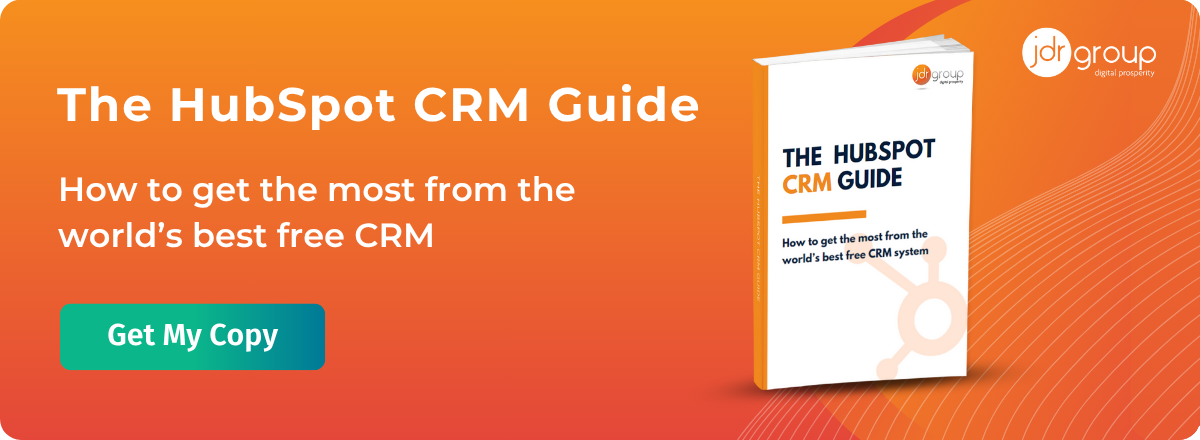Emerging Marketing Technologies 2024+: What To Expect And How An Agency Can Help

As we look towards 2024, the marketing technology landscape is experiencing significant changes. Let’s look at a few of the interesting ways these trends could shape the near-term future of marketing, and how partnering with an agency can help SMEs navigate a complex and changing landscape, and make the best use of emerging technologies.
1. AI-Driven Marketing Analytics
AI must be a contender for word of the year 2023, but when most people talk about AI they are usually referring to ‘generative AIs’ such as ChatGPT. These applications are very much a mixed blessing when it comes to marketing. A more promising and transformative use of AI is in the ongoing field of AI-driven marketing analytics, already used in market-leading platforms such as HubSpot and Salesforce.
By leveraging machine learning (ML) and data mining, AI enables businesses to analyse huge volumes of data at unprecedented speed, making data-driven decisions more efficient and accurate. Consequently, businesses can achieve improved targeting, allowing them to reach the right customers, at the right time, with the right message. An AI’s ability to analyse large volumes of data can also help business owners predict emerging market trends and customer behaviours, strategically positioning their offerings and customising their marketing messages to meet customer needs.
2. Virtual Reality (VR) & Augmented Reality (AR)
VR and AR are changing the potential ways that customers experience content by providing immersive, interactive, and personalised experiences that traditional digital marketing formats simply can't match. When integrated into marketing campaigns, these technologies could drive greater customer engagement, increase brand awareness, and ultimately result in higher conversion rates.
However, before we get too excited about VR and AR marketing, it is important to note that VR and AR devices are not widely used by business decision-makers in 2023, if at all. This could easily change, however, and as soon as an affordable and practical VR/AR interface becomes available for workplace use, a wide range of new marketing approaches will suddenly become available.
These include the ability to offer more immersive content experiences to forge emotional connections between the brand and its audience – such as interactive social media adverts, delivering realistic product and sales demonstrations in a way that enhances the power of webinars and sales videos, and even establishing virtual online shops that customers can explore from the comfort of their offices or homes.
3. Interconnected Devices
The proliferation of Internet-connected devices, also known as the Internet of Things (IoT) could potentially change the marketing landscape in several interesting ways. These devices, ranging from smartphones and tablets to TVs, speakers, office appliances, and wearable technologies, are constantly gathering data about user behaviour.
As these devices become more integrated into the daily lives of business decision-makers, they will provide service providers with unprecedented opportunities to deliver personalised and contextually relevant content. Many of these devices also enable real-time engagement, enabling businesses to interact with their customers at the precise moment that their service or product is most relevant. This technology could help advertising and marketing content become a more seamlessly integrated part of the user experience, rather than an ‘interruption’.
4. Smart Chatbots
Website chatbots already play a major role in customer service and lead generation for thousands of small businesses. With the introduction of AI into chatbot technology, website chatbots are becoming increasingly sophisticated, capable of understanding and responding to a wider range of customer enquiries in real-time. This provides businesses with the opportunity to offer personalised interactions at scale – something that would be impossible with human agents or traditional chatbots alone. Beyond simply answering questions, an AI chatbot could provide product or service recommendations based on customers’ previous purchases or even their browsing history, help customers navigate the website, and assist with the checkout process. Furthermore, each interaction with a chatbot provides businesses with valuable data that can be used to further refine and improve their marketing strategies.
5. Social Commerce
So-called social commerce, the integrative fusion of social media and Ecommerce, is a rapidly growing trend among both B2B and B2C businesses and is poised to make significant strides in 2024 and beyond. This combination allows consumers to make purchases directly from businesses using their social media platforms, bypassing the business website and facilitating a more seamless shopping experience that eliminates the need to navigate away from the platform.
The integration of shopping features with social media not only simplifies the purchasing process for customers but also allows for greater personalisation in the customer experience. For example, based on a user’s interactions, likes, and shares, businesses can showcase specific products tailored to individual tastes, making suggestions that are more relevant and the shopping journey more engaging. Social commerce can also make better use of the power of user-generated content, such as product reviews and ratings, adding an additional layer of trust and authenticity to the Ecommerce process, while also allowing customers to share their purchases with their networks, effectively turning every interaction into a potential marketing opportunity.
Embracing The Future With The Support Of An Experienced Marketing Agency
Prosperous futures belong to businesses that prepare for it today, and making a smart choice for your business in step with current and emerging trends can result in improved efficiencies, deeper market insights, and enhanced experiences for your customers.
However, the danger of trending technologies for small businesses is, on one hand, the temptation of spreading resources too thinly in order to capitalise on every emerging trend and, on the other, of missing out on crucial opportunities due to a lack of knowledge or time.
This is where working with an experienced marketing agency can make a valuable long-term contribution to how your business leverages the value of new technologies. Your agency partner can help you implement the most appropriate processes and systems to achieve your goals and engage with your customers, without wasting time on blind alleys. Furthermore, all emerging marketing tools and technologies require a foundation of basic marketing knowledge and expertise to implement effectively. By working with an experienced agency, you will leverage a better ROI, with a shorter time before you see concrete results.
To find out more about our digital marketing services and how we can help, please contact JDR Group today.
Image Source: Pexels



